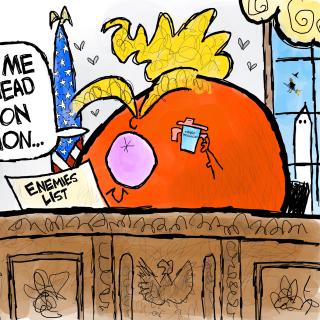Advertisement
If your name is Donald Trump, or Dick Cheney, or George W Bush, then don’t bother reading this. This article is to help the rest of us to better understand how Donald Trump et al think. The psychiatric literature has long known that people with narcissistic personality disorder, also called the narcissistic sociopath, are far more common at the upper end of politics and business in the United States. About 1% of people in general show the criteria of the condition, yet 20% of CEOs in “Fortune 500” companies and many politicians in this country have these characteristics.
So it pays to know how these people think since it allows us to accurately predict their behavior. The cause of narcissistic personality condition can be summarized in three words: low self-esteem. The person’s thinking process is overwhelmed with the need to show them as powerful and important. It is much more common in men than women, and, thus, testosterone, one of the key driving forces of emotional behavior, powers this condition.
The three criteria for diagnosing narcissistic personality condition are straightforward. They are: 1) exaggerated feeling of self-importance; 2) lack of empathy towards others that is seen either as a lack of interest in other’s reactions or an actual enjoyment out of creating problems for others, 3) a strong ability to deceive people as to the true intentions of one’s behavior. What these three criteria have in common is that they all act to hide from the consciousness of the narcissistic sociopath the one thought that scares them more than anything else: that they themselves are not competent and not worthy of attention. The last psychiatric point to stress is that these traits must be stable over many years. Everyone now and then gets feelings of increased self-importance or lack of empathy for others. This does not make one a narcissistic personality disorder. One must show each of these three traits consistently over the years.
It is easy to determine if someone has this condition. Since people with narcissistic sociopath condition are obsessed with blocking any thought of low self-esteem, they are rigid, inflexible, and decide based on emotions, not critical thought. Psychiatrics use the term “blocking” to describe how such strong emotional thoughts block other thought processes, including creative thought and complex problem-solving. Hence, you will not find people with narcissistic personality condition in positions that require a great deal of objective, critical thought, such as among top scientists (with the interesting exception of scientists who falsify their results) or social activists. They seek out positions where they can negatively impact many people so they are not “loners”. A basic tool all people with narcissistic personality condition have is that they jump at the chance to belittle others since, in their mind, making someone else seem dumb, bad, or foolish automatically elevates them by blocking the deeply hidden thought that it is they who are incompetent.
The trait that most strongly characterizes the narcissistic sociopath is that they have developed a high level of ability to con people into doing things against their own self-interest. Why is this skill so important? It is because negatively impacting others they perceive as representative of their own fears is the absolute key to proving to themselves that they are better and thus competent and worthy.
Let’s now put this in action and see if you can think like a narcissistic sociopath. You work for a financial company and are asked to learn a complicated new system to earn higher profits through corporate bonds. You are told that another person in the company is an authority in the field. It would be reasonable to think: “ I don’t know much about that, and the other person has been helpful to me in the past, so I will ask for his help.” But one won’t think that way if they are a narcissistic sociopath. So you respond by saying: “I can learn that in a few days” and then you think how your will discredit the person who is the authority. Since the President of the company is religious and conservative, you decide to start a whisper campaign that the person who is expert is gay and an atheist. It works and he is subjected to much ridicule until he leaves. Yet you learn enough from him before he leaves to make it appear that you are now an expert in the field. So all of this behavior is reinforced which is the simplest way to assure that such behavior will continue.
Let’s go to another example but with bigger stakes. You are governor of a state and need to decide how to dispense health care to the poorest women in your state. The thought process is easy to predict. The narcissistic sociopath, usually a man, will decide on the route that reinforces their perceived power over women. Thus, to defund such health care is to counteract the governor’s own feelings of inadequacy by showing that he has the power to control women and to deny poor people such services. Although such thinking is subconscious it is nonetheless very powerful, as is any emotional-based behavior. And, of course, one has to explain it in such a way as to hide the true intentions of the decision by rationalizing the acts with such terms as balancing the budget and sanctity of life. Yet, underneath this garnish is the classic narcissist thought that the person making the decision is superior to those affected by the decision and thus is entitled to do whatever he wants, however much it hurts those affected. The alternative decision to provide health care to such women would in the governor’s mind mean that poor women are equal to him in this category, which is obviously not acceptable to a narcissistic sociopath
One does not have to be a psychiatrist to spot many examples of narcissistic personality condition in our society. With a little practice, anyone can become as good as any trained psychiatrist in both predicting and understanding such behavior. As a psychiatrist colleague of mine said: “the simplest way to spot a narcissistic personality type is to look for one who bullies and lies, and adds to that a touch of the con man.” And with the presidential election one year away, we all will have ample opportunity to do just that, especially with the Republican field.



